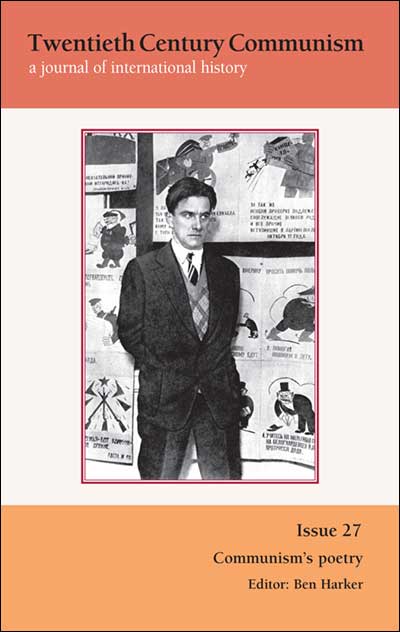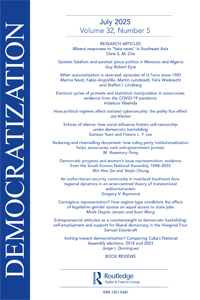Tous deux lauréats de la Fondation en 2022-2023, Edward Lee-Six et David Talukder ont publié des articles issus de leurs recherches postdoctorales respectivement à l’ULB et à l’Université de Cambridge.
 Edward Lee-Six, Docteur en Littérature française et anglaise (Université de Cambridge), a consacré à l’auteur au cœur de ses recherches à l’ULB, Émile Verhaeren, un article intitulé « Émile Verhaeren and the question of Bolshevik poetry » (Twentieth Century Communism – Volume 2024 Number 27). Il y analyse les raisons du succès de Verhaeren en Russie et dans la jeune URSS, où l’œuvre du poète belge fut interprétée de manière très différente par rapport à la réception critique en Europe occidentale.
Edward Lee-Six, Docteur en Littérature française et anglaise (Université de Cambridge), a consacré à l’auteur au cœur de ses recherches à l’ULB, Émile Verhaeren, un article intitulé « Émile Verhaeren and the question of Bolshevik poetry » (Twentieth Century Communism – Volume 2024 Number 27). Il y analyse les raisons du succès de Verhaeren en Russie et dans la jeune URSS, où l’œuvre du poète belge fut interprétée de manière très différente par rapport à la réception critique en Europe occidentale.
Le Dr Lee-Six est actuellement Maître de conférences en Langues et littératures anglaises et anglo-saxonnes à l’Université Paris 1 Panthéon-Sorbonne.
Abstract
Émile Verhaeren, though largely forgotten today, was famous during his life-time and in the decades immediately after his death, his celebrity stretching from London to Moscow. This article argues that the reasons for this celebrity were nevertheless profoundly different in East and West: in England, France and Belgium, Verhaeren owed his fame largely – though not exclusively – to his reputation as a Belgian patriot against the background of WWI, and as the spokesman for Flemish cultural identity. In Russia, by contrast, after both the 1905 Revolution and the 1917 Revolution, Verhaeren was read as a prophet of proletarian-led social change. This reading was determined both by its political context and its theoretical context: that is, the debates on socialist realism in the young USSR. How could socialist realism – a theory developed around the novel – provide a relevant analytical framework when it came to poetry? Verhaeren’s verse seemed to offer an answer to this question. Furthermore, not despite, but thanks to, this strong contextual determination, Soviet critics picked up on something in Verhaeren’s poetry that most Western readers missed.
 David Talukder, Docteur en Sciences politiques et sociales (ULB), a publié avec Xavier Romero-Vidal un article intitulé « From Boomers to Zoomers: Generational shifts in drivers of satisfaction with democracy in Western Europe » (Democratization, 24 mars 2025). Les auteurs, qui ont travaillé ensemble à l’Université de Cambridge à l’époque du mandat FWA du Dr Talukder, y décryptent les facteurs pouvant expliquer les différences générationnelles dans l’appréciation du système démocratique.
David Talukder, Docteur en Sciences politiques et sociales (ULB), a publié avec Xavier Romero-Vidal un article intitulé « From Boomers to Zoomers: Generational shifts in drivers of satisfaction with democracy in Western Europe » (Democratization, 24 mars 2025). Les auteurs, qui ont travaillé ensemble à l’Université de Cambridge à l’époque du mandat FWA du Dr Talukder, y décryptent les facteurs pouvant expliquer les différences générationnelles dans l’appréciation du système démocratique.
Après son séjour à Cambridge, le Dr Talukder a été nommé chercheur postdoctoral à l’Université de Namur dans le cadre du projet ERC Starting Grant POLSTYLE.
Abstract
A crucial factor for the survival of democracies is the extent to which democratic attitudes are widespread in a society. Yet, in a context of increasing dissatisfaction in Western Europe, some studies suggest that younger generations are becoming less attached to democracy. In this article, we take a step back and explore the factors that can explain generational differences in democratic attitudes. In particular, we identify the political and economic drivers of satisfaction with democracy and test for variation across generations in West European democracies. By incorporating the newly of-age Generation Z, we compare the political drivers of satisfaction with democracy of this cohort with those of older generations. Our results show that younger cohorts’ satisfaction with democracy is more influenced by economic conditions than previous cohorts. The results highlight the importance of addressing the economic well-being and specific needs of younger generations to mitigate their disenchantment with democracy.


